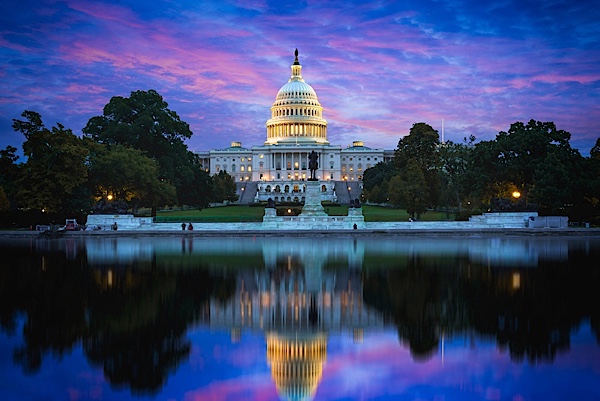 Credit: pat138241 / iStockphoto
Credit: pat138241 / iStockphoto
The Department of Homeland Security, NASA, the Pentagon, and the Cybersecurity and Infrastructure Security Agency maintain headquarters in and around Washington, D.C. Few regions rely on cybersecurity as heavily as the District of Columbia, which presents many opportunities for cybersecurity professionals in the area.
According to CompTIA's State of the Tech Workforce, Washington, D.C., has more than 58,000 job postings in tech, including over 14,000 listings in emerging tech. Washington, D.C., needs newly trained security tech specialists to fill these roles.
Discover programs for Washington, D.C., cybersecurity students in this helpful guide, along with promising career outlook data for cybersecurity in D.C.
Washington, D.C. at a Glance
- Average Wage for Computer and Mathematical Occupations: $113,720
- % of Workforce in Tech: 9.2%
- Economic Impact of Tech Industry: $10 billion
- Number of Higher Learning Institutions: 19
Sources: Cyberstates™, NCES, OEWS
Why Go to D.C. to Learn Cybersecurity?
Postsecondary education in Washington, D.C., began in 1789 with Georgetown University. Since then, the number of schools in the district has grown to 19, including 17 private schools. According to the National Center for Education Statistics (NCES), the district has more than 85,000 students.
With the prevalence of private schools in Washington, D.C., most students pay the same tuition rates regardless of where they live. Learners looking to study outside the District of Columbia's borders can research the DC Tuition Assistance Grant (DCTAG), which provides funding that reduces the cost of out-of-state tuition.
Despite its small geographic footprint, the District of Columbia's traffic can create long commutes, which makes online learning an effective study option. Still, students will not have to travel far for on-campus requirements.
To stimulate growth in the tech field, the District of Columbia introduced a STEM program that improves educational pathways, professional development, and outreach. With STEM initiatives and Washington, D.C.'s national defense infrastructure, students can use their cybersecurity education to pursue many opportunities.
Education Statistics for Washington, D.C.
The District of Columbia has 19 colleges, but the percentage of students in online courses is quite low compared to the national average.
| Higher Education Statistics | Washington, D.C. Data | National Data |
|---|---|---|
| Four-Year Colleges | 17 | 2,679 |
| Two-Year Colleges | 2 | 1,303 |
| Students Enrolled in Distance Education | 48.2% | 72.8% |
Sources: NCES
Accreditation for Washington, D.C. Schools
Institutional accreditation recognizes high quality in colleges and universities. According to the Council for Higher Education Accreditation, all 19 colleges and universities in the District of Columbia hold institutional accreditation. Most schools in Washington, D.C., receive accreditation from the Middle States Commission on Higher Education.
Departments or programs within schools may also receive this status. Programmatic accreditation provides quality assurance and may impact employment and postgraduate certification opportunities. Many schools pursue ABET accreditation for their computer-related programs.
Considerations for Studying Cybersecurity in D.C.
Many factors go into making a school and program decision. When looking for the right Washington, D.C., cybersecurity degree, students should research each program's cost, length, and location.
Learners should also consider their career goals to find their ideal program. For example, they can look for programs with relevant concentrations or instructors who have experience and relationships with specific cybersecurity industries.
Prospective students should also consider their preferred program format and delivery method. While the District of Columbia has relatively low online participation rates, several schools feature online programs with flexible study schedules.
Explore rankings for top cybersecurity programs around the country:




Cybersecurity Concentrations and Similar Degrees
While cybersecurity schools and degrees can offer a direct pathway to the field, aspiring cybersecurity professionals can take other routes. The following table highlights related programs that cover similar material. These programs may offer cybersecurity specializations or allow learners to create concentrations through electives and internships.
Information Assurance
These programs explore organizational strategies, laws, and policies regarding information. Students learn how organizations manage, secure, and monitor access to data. Graduates typically pursue careers in information security.
Computer Systems Engineering
This program examines the design and development of computer systems. Enrollees may study methods for securing and designing these systems. Graduates can pursue employment opportunities to improve the cybersecurity infrastructure in Washington, D.C.
Information Systems Security
In this program, students learn to design and develop security for information systems. They also study operational security practices to help organizations improve their policies. Degrees in this field can qualify graduates for security consulting and analysis careers.
Popular Online Programs
Learn about start dates, transferring credits, availability of financial aid, and more by contacting the universities below.
Paying for Your Cybersecurity Degree
Paying for a degree can be challenging and stressful, but Washington, D.C., offers several options and support programs to help students cover costs. While the District of Columbia only has two public schools, the in-state tuition rates in these colleges come in well below the national average.
The District of Columbia's D.C. Futures Program provides financial support for students in need. Learners can also apply for federal loans and grants, plus school scholarships and District of Columbia scholarship programs. Many organizations run STEM-specific scholarship programs as well.
In-State Versus Out-of-State Tuition
Public schools typically offer lower tuition rates for in-state learners than out-of-state enrollees, which allows public schools to attract in-state students and retain local talent. With only two public colleges in Washington, D.C., locals have limited options for in-state tuition.
While Washington, D.C., does not participate in any reciprocity programs with other states, the district does offer DCTAG. This program provides funding to District of Columbia students who attend out-of-state schools.
Washington, D.C.'s Cost of Living
Prospective students should consider the cost of living in their region and how that might affect their education. According to Payscale, Washington, D.C.'s cost of living is 39% higher than the national average. Housing makes up most of this disparity, with costs reaching 148% higher than the national average.
Washington, D.C., helps make up for high living costs with tech wages 50% higher than the national average, according to CompTIA.
Washington, D.C. Cybersecurity Careers
Despite its small size, Washington, D.C., hosts a substantial tech industry. According to the Bureau of Labor Statistics (BLS), the District of Columbia has the country's highest concentration of computer and mathematical occupations. Professionals in this region also earn the third-highest annual mean wages.
The two largest tech occupations in Washington, D.C., occur within the software and cybersecurity sectors. These fields also have some of the highest projected growth rates across the country. Adding to the opportunities for Washington, D.C., cybersecurity graduates can also pursue careers in the district's finance, business, and healthcare sectors.
Below, we outline some available cybersecurity-related careers.
Select Cybersecurity D.C. Jobs
Penetration Tester
Penetration testers simulate cyberattacks to spot vulnerabilities in systems and applications. This process helps organizations identify weaknesses and predict where cyberthreats might come from. A penetration tester typically needs a bachelor's degree for employment.
- Salary for Penetration Testers (March 2023): $90,820
- Job Outlook in Washington, D.C. (2020-30): +36.6% (information security analysts)
Computer Forensics Analyst
Computer forensic analysts investigate cyberattacks and other computer-related crimes. They analyze evidence to pinpoint attackers' identities and motives, along with supporting the recovery process. These professionals usually need bachelor's degrees.
- Salary for Forensic Computer Analysts (March 2023): $75,530
Chief Information Security Officer
CISOs manage information security operations for organizations. They oversee the projects, staff, technologies, and business decisions related to security. A CISO needs a bachelor's degree at minimum, but many positions require a master's degree.
- Salary for Chief Information Security Officers (March 2023): $173,110
The table below includes details on other related careers.
Washington, D.C. Employment Trends
| Year | State | National |
|---|---|---|
| Computer Hardware Engineers | ||
| 2020 Employment | 520 | 66,200 |
| 2030 Projected Employment | 480 | 67,300 |
| Projected Job Growth, 2020-2030 | -7.7% | +1.7% |
| Computer Network Architects | ||
| 2018 Employment | 1,420 | 165,200 |
| 2030 Projected Employment | 1,500 | 174,200 |
| Projected Job Growth, 2018-2028 | 5.6% | +5.4% |
| Software Developers and Software Quality Assurance Analysts and Testers | ||
| 2020 Employment | 9,710 | 1,847,900 |
| 2030 Projected Employment | 11,700 | 2,257,400 |
| Projected Job Growth, 2020-2030 | 20.5% | +22% |
Source: Projections Central
| Career | Washington, D.C. Employment | Washington, D.C. Annual Mean Wage | National Median Annual Wage |
|---|---|---|---|
| Computer and Information Systems Managers | 5,060 | $176,000 | $159,010 |
| Computer Hardware Engineers | 480 | $117,730 | $128,170 |
| Computer Network Architects | 1,030 | $126,360 | $120,520 |
| Computer Network Support Specialists | 830 | $86,880 | $62,760 |
| Computer Programmers | 840 | $112,120 | $93,000 |
| Computer Systems Analysts | 2,230 | $118,050 | $99,270 |
| Information Security Analysts | 2,130 | $124,980 | $102,600 |
| Network and Computer Systems Administrators | 1,410 | $104,490 | $80,600 |
| Software Developers | 9,460 | $124,770 | $109,020 |
| Web Developers | 640 | $95,180 | $78,300 |
Source: BLS OEWS
In Washington, D.C., cybersecurity employment appears strong for network and software occupations. Both fields received projected growth figures that align with average national rates. The District of Columbia hosts concentrated workforces for these professionals and high wages, as well.
In most information technology careers, the annual mean wages in Washington, D.C., exceed the national averages. As a national hub for technology, the district hosts many high-paying job opportunities. However, the appeal of these positions can lead to stiff competition.
Cybersecurity Employers in Washington, D.C.
Along with the various national security and defense organizations, Washington, D.C., has many top employers for cybersecurity professionals.
OSIbeyond: This organization provides cybersecurity and IT solutions for small and medium-sized companies. OSIbeyond offers compliance services, risk assessments, training, and consulting.
Ridge Global: Founded by the first U.S. Secretary of Homeland Security, Ridge Global provides cybersecurity services to organizations through consulting, insurance, and education.
Virtru: Virtru develops and sells data encryption and privacy applications to help users share data more securely. The organization has specialized products for the aerospace, defense, education, healthcare, and finance industries.
Professional Cybersecurity Organizations in D.C.
National Cybersecurity Society
The NCSS promotes education and awareness about online security. The organization advocates for small business security and offers advisory services to partners and members.
National Defense ISAC
The ND-ISAC is a community for sharing information and best practices for physical and cyber-related security. Members can provide and access information about threats and mitigation strategies.
Information Systems Security Association - National Capital Chapter
ISSA-DC offers support and professional development opportunities to IT professionals in the region. Members can access meetings, publications, and educational forums.
National Cyber Security Alliance
The alliance builds industry partnerships and advocates for safe and secure technology use. Members can access educational opportunities, events, and resources.
Schools With Cybersecurity Courses in Washington, D.C.
Questions About Cybersecurity in Washington, D.C.
Can I study cybersecurity in Washington, D.C.?
Yes. Learners can pursue several Washington, D.C., cybersecurity programs. Options include majors and minors at the bachelor's and master's levels, plus certificates and courses.
Are the best cybersecurity schools in D.C. expensive?
Washington, D.C., cybersecurity schools can be expensive due to their private status. Typically, private schools have higher tuition rates than public schools, but financial aid can help reduce costs.
Can I take online cybersecurity courses in Washington, D.C.?
Yes. Several Washington, D.C., cybersecurity courses occur online — George Washington University offers two online master's programs in cybersecurity. These flexible programs allow learners to schedule courses around work obligations.
Is cybersecurity a good career in D.C.?
Yes. In Washington, D.C., cybersecurity is a strong career option. According to the BLS, the District of Columbia has the second-highest concentration of information security analysts in the country.
Recommended Reading
Take the next step toward your future.
Discover programs you’re interested in and take charge of your education.
